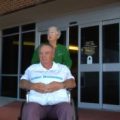
This is a guest post by Dr. Gary VanderArk, CCMU's board president and founder. A retired neurosurgeon, he now teaches at the University of Colorado Health Sciences Center. He has spent his career as a relentless crusader for the medically underserved and firmly believes in equity for all in health care.
Many years ago, some friends of mine went home to Cambodia for a family visit and met a young neurosurgeon in Phnom Penh. This young man was one of three neurosurgeons for a country of 12.5 million people. My friends gave him my email address and advised him to contact me if there was ever anything he needed. Almost immediately, he began to write weekly about patients he could have saved if only he had had the proper equipment.
Wanting to help, I began contacting the manufacturers and begging for equipment donations. Within a few months, I had a closet full of operating tools. I decided that I could not just ship this stuff to Cambodia--I needed to deliver it personally and make certain that he knew how to use it. So I did. I took a month off and went to Cambodia and we operated together.
Patient after patient that came through the operating room was a victim of a traffic accident. In fact, nearly all of our patients were accident victims. There was an easy explanation though, and it was right outside the window: Phnom Phen has 1.2 million people and a million motorbikes, but only about 12 helmets. It was not surprising that most of our patients were involved in motor vehicle accidents.
On my 15-hour flight home, I couldn’t help but think about what I had done. In response to a need, I had delivered some very sophisticated surgical tools and we had put them to good use, but wouldn’t it have been much more appropriate to deliver a plane load of helmets? I couldn’t help but wonder if I had missed an opportunity.
As health care providers, we aim to treat the disease and not just the symptoms. The same holds true for improving the health care system—we are better off treating the cause of the problem, not just the symptoms. Whether it is because we are too caught up in the crisis at hand, can’t step back far enough to see the big picture, or don’t know the right solution, sometimes in health care we fail to act in a way that addresses the deeper issue.
My trip to Cambodia taught me an important lesson about taking the time to determine the real problem before acting on a solution. Sometimes even when we do good, we miss opportunities to do better. My advice to you is to periodically step back from your daily work and try to understand the root cause of the problem you are trying to solve. And always remember, the best course of action will be the one that does the most good, for the most people.




